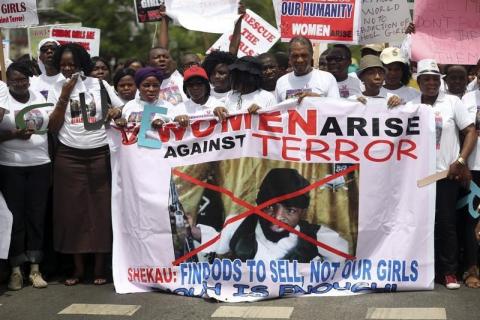Advertisement
U.N. Security Council blacklists Boko Haram leader, splinter group
UNITED NATIONS (Reuters) - The United Nations Security Council sanctioned the leader of Nigeria's Boko Haram and a splinter group on Wednesday, the first individual and entity to be designated by the world body since the Islamist militant group was blacklisted, diplomats said.
Leader Abubakar Shekau and Boko Haram faction Ansaru will be banned from international travel and their assets frozen under the U.N. al Qaeda sanctions list.
Russia placed a "technical hold" on the designations two weeks ago because it needed more time to review the listings, but diplomats said they lifted the hold on Wednesday, allowing the sanctions to come into force.
Last month, the Security Council al Qaeda sanctions committee blacklisted Boko Haram at the request of Nigeria, following global outrage when the group kidnapped more than 250 girls from a school in remote northeastern Nigeria on April 14.
The Islamist militant group was described in the U.N. listing as an affiliate of al Qaeda and the Organization of al Qaeda in the Islamic Maghreb (AQIM). It is subjected to a travel ban, an asset freeze and an arms embargo.
Boko Haram faction Ansaru, blamed for the killing of several Western hostages, is AQIM's bona fide affiliate in Nigeria, and called itself "al Qaeda in the Land Beyond the Sahara" in a video with a British and Italian hostage in 2011.
Ansaru broke off from Boko Haram in protest at its killing 186 mostly Muslim civilians in the medieval Islamic city of Kano in early 2012.
Shekau is the purported leader of Boko Haram. A year ago, U.S. Secretary of State John Kerry authorized a reward of up to $7 million for information leading to his location.
Boko Haram's five-year-old insurgency is aimed at reviving a medieval Islamic caliphate in modern Nigeria, whose 170 million people are split about evenly between Christians and Muslims. The group is becoming, by far, the biggest security threat to Africa's top oil producer.
Boko Haram, which in the Hausa language broadly means "Western education is sinful," is loosely modeled on the Taliban movement in Afghanistan.
(Reporting by Michelle Nichols; Editing by David Gregorio)



















Add new comment